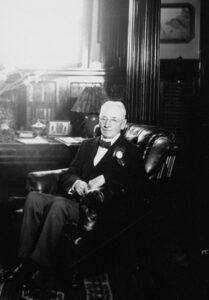
John B. Knox. Public Library of Anniston and Calhoun County
Anniston’s John B. Knox, born before the Civil War, raised during Reconstruction, expertly schooled in law and Southern extremism, retains one of Alabama’s most irredeemable legacies. It envelopes him like a burial shroud. Eighty-five years of eternal rest at Hillside Cemetery have offered no respite.
Knox didn’t singlehandedly rewrite Alabama’s Constitution in 1901, but it is, in essence, his repugnant document. He presided over the convention of delegates. He became its most prominent defender. He campaigned statewide for its ratification. And he never wavered from this core belief, taken from a speech he spewed that November in Bibb County:
“The new constitution eliminates the ignorant negro vote, and places the control of our government where God Almighty intended it should be — with the Anglo-Saxon race.”
If only that was all he said. (Hint: It isn’t.) But at least Alabama voters have started the process of de-Knoxing the state’s damnable governing document of the racist language that soils it. The passage of Amendment 4 on Nov. 3 is an Alabama oddity: a progressive movement, incremental and glacial as it is.
Why those passages weren’t excised decades ago, and why removal requires another rewrite and another statewide vote, is something only longtime admirers of Alabama’s volatile mix of politics and race relations can adequately grasp.
Knox is this story’s obvious villain, but he’s one of many. They’re ubiquitous, these white men of money and prestige — Bourbon Democrats, obviously — who wanted what other Southern states already had: a government fully “redeemed” from Reconstruction-era policies that empowered freedmen and reduced elites’ hold on everything.
Once expectant of becoming one of Alabama’s most prosperous cities, Anniston in 1901 was already seeing its future. It wasn’t pristine, a small city stagnated by creeping economic mediocrity. In an editorial, an Anniston newspaper seethed with disappointment. “Other neighboring towns of less population and far less advantages have outstripped Anniston within the past twelve months … Our people know it. The mystery is why do they permit it.”
Among other things, Knox and his Calhoun County colleagues felt the new state constitution — a document that would put Blacks and poor whites in their place and allow Bourbon leaders to rule without real interference — would serve as an antiseptic to the malaise.
Anniston then had two main daily newspapers, The Hot Blast and The Evening Star. (They merged in 1912 to create today’s Star.) The Hot Blast was older, aligned with the city’s founders and wildly racist. The Evening Star offered a hint of judiciousness.
On the eve of the statewide vote to authorize a constitutional convention, The Hot Blast pushed Knox’s racism as far as it could without advocating unadulterated violence.
It wrote: “It is good for the white man and better for the negro that the basis of suffrage be fixed now while it may be done peacefully and with an eye to the best interests of both races.”
And it wrote: “If you favor the rule of the white man and want to see once more honest election methods in Alabama, you will go to the polls and vote for the convention.”
And it wrote: “It took two thousand years to prepare the white race for freedom and the exercise of the ballot. The negro was given the ballot without a day of preparation. What has he done to be so favored among the races?”
And it wrote: “‘Blood is thicker than water.’ We stand by our race in this fight.”
Seven months later, on the eve of the statewide ratification vote, The Hot Blast’s headline left no doubt. “White supremacy is the paramount issue,” it read.
In Birmingham, Knox told a gathering of 1,500 that “just as long as 180,000 negroes have as much right to vote as you and I, there is standing a constant menace to all of us. The great object we have undertaken is to maintain white supremacy — not by force but by law.”
And yes, if you’re wondering, this still matters.
Until today’s lawmakers recast the state constitution, and until today’s voters approve, Alabama’s governing document is tainted by the bigotry and intolerance that crafted it. These overt remnants of white supremacy are ours, yours and mine, because we’ve allowed them to live on amid our state’s most vital written organ.
Our chance, Alabama’s chance, is near, a few additional steps to modernity.
When Knox gaveled the constitutional convention to a close in 1901, the delegates baldly sang a song, “God Be With You ’Till We Meet Again.” They also gave Knox, their presiding leader, a gold watch inscribed with a French motto: “Sans Peur, Sans Reproche.”
“Without fear, beyond reproach,” it read.
Anniston’s John B. Knox, born before the Civil War, raised during Reconstruction, expertly schooled in law and Southern extremism, retains one of Alabama’s most irredeemable legacies. It envelopes him like a burial shroud. Eighty-five years of eternal rest at Hillside Cemetery have offered no respite.
Knox didn’t singlehandedly rewrite Alabama’s Constitution in 1901, but it is, in essence, his repugnant document. He presided over the convention of delegates. He became its most prominent defender. He campaigned statewide for its ratification. And he never wavered from this core belief, taken from a speech he spewed that November in Bibb County:
“The new constitution eliminates the ignorant negro vote, and places the control of our government where God Almighty intended it should be — with the Anglo-Saxon race.”
If only that was all he said. (Hint: It isn’t.) But at least Alabama voters have started the process of de-Knoxing the state’s damnable governing document of the racist language that soils it. The passage of Amendment 4 on Nov. 3 is an Alabama oddity: a progressive movement, incremental and glacial as it is.
Why those passages weren’t excised decades ago, and why removal requires another rewrite and another statewide vote, is something only longtime admirers of Alabama’s volatile mix of politics and race relations can adequately grasp.
Knox is this story’s obvious villain, but he’s one of many. They’re ubiquitous, these white men of money and prestige — Bourbon Democrats, obviously — who wanted what other Southern states already had: a government fully “redeemed” from Reconstruction-era policies that empowered freedmen and reduced elites’ hold on everything.
Once expectant of becoming one of Alabama’s most prosperous cities, Anniston in 1901 was already seeing its future. It wasn’t pristine, a small city stagnated by creeping economic mediocrity. In an editorial, an Anniston newspaper seethed with disappointment. “Other neighboring towns of less population and far less advantages have outstripped Anniston within the past twelve months … Our people know it. The mystery is why do they permit it.”
Among other things, Knox and his Calhoun County colleagues felt the new state constitution — a document that would put Blacks and poor whites in their place and allow Bourbon leaders to rule without real interference — would serve as an antiseptic to the malaise.
Anniston then had two main daily newspapers, The Hot Blast and The Evening Star. (They merged in 1912 to create today’s Star.) The Hot Blast was older, aligned with the city’s founders and wildly racist. The Evening Star offered a hint of judiciousness.
On the eve of the statewide vote to authorize a constitutional convention, The Hot Blast pushed Knox’s racism as far as it could without advocating unadulterated violence.
It wrote: “It is good for the white man and better for the negro that the basis of suffrage be fixed now while it may be done peacefully and with an eye to the best interests of both races.”
And it wrote: “If you favor the rule of the white man and want to see once more honest election methods in Alabama, you will go to the polls and vote for the convention.”
And it wrote: “It took two thousand years to prepare the white race for freedom and the exercise of the ballot. The negro was given the ballot without a day of preparation. What has he done to be so favored among the races?”
And it wrote: “‘Blood is thicker than water.’ We stand by our race in this fight.”
Seven months later, on the eve of the statewide ratification vote, The Hot Blast’s headline left no doubt. “White supremacy is the paramount issue,” it read.
In Birmingham, Knox told a gathering of 1,500 that “just as long as 180,000 negroes have as much right to vote as you and I, there is standing a constant menace to all of us. The great object we have undertaken is to maintain white supremacy — not by force but by law.”
And yes, if you’re wondering, this still matters.
Until today’s lawmakers recast the state constitution, and until today’s voters approve, Alabama’s governing document is tainted by the bigotry and intolerance that crafted it. These overt remnants of white supremacy are ours, yours and mine, because we’ve allowed them to live on amid our state’s most vital written organ.
Our chance, Alabama’s chance, is near, a few additional steps to modernity.
When Knox gaveled the constitutional convention to a close in 1901, the delegates baldly sang a song, “God Be With You ’Till We Meet Again.” They also gave Knox, their presiding leader, a gold watch inscribed with a French motto: “Sans Peur, Sans Reproche.”
“Without fear, beyond reproach,” it read.
